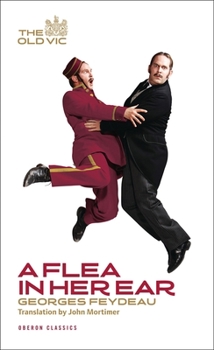A Flea in Her Ear
Select Format
Select Condition 
Book Overview
Eccentric and hillarious, Georges Feydeau's much loved comedy mixes madness, mayhem, fun and frivolity. When the beautiful wife of Victor Chandebise suspects of having an affair, she enlists the help of her dearest friend to entrap him. Their plan to entice him to a rendezvous at the Hotel Coq D'or spectacularly misfires and chaos ensues. Set in the decadent surroundings of Belle poque Paris, Feydeau's quintessential farce promises to be an exhilerating...
Format:Paperback
Language:English
ISBN:1849430861
ISBN13:9781849430869
Release Date:October 2011
Publisher:Oberon Books
Length:144 Pages
Weight:0.35 lbs.
Dimensions:0.4" x 5.0" x 8.1"
Customer Reviews
2 ratings
A Sitcom Play.
Published by Thriftbooks.com User , 19 years ago
A FLEA IN HER EAR (a more accurate translation of the title should have been A BEE IN HER BONNET) is probably Georges Feydeau's most well-known work. The play is a farce that examines both marriage and the bourgeoisie lifestlye. Victor-Emmanuel Chandebise has been having problems in bed recently. His wife, Raymonde, suspects that his lack of arousal is because he has been having an affair. In actuality Victor-Emmanuel has been seeking the help of a doctor for his problem and has been completely loyal and faithful to his wife. Raymonde, on the other hand has contemplated having an affair. Nevertheless, to deduce whether her husband has been faithful, she concocts what appears to be simple plan. She has a close friend write a letter to Victor-Emmanuel, pretending to be someone who saw him at the theatre and offering him a night of pleasure at the Hotel Casablanca. The simple plan soon becomes complex when Victor-Emmanuel gives the letter to his close friend, Tournel, who has been lusting for Raymonde. Meanwhile, a copy of the letter is found by the Spanish husband of Raymonde's friend and he leaves in a rage of vengenance convinced that his wife is up to no good. The action then proceeds to the hotel where the confusion continues to snowball as the drunken porter, Poche, is constantly mistaken for Victor-Emmanuel. The mistaken identity twist adds another level of hilarity to the mix. The final act of the play begins and ends back at the Chandebise home and everything is made right. This is a very difficult play to perform and direct and, like such a modern play as NOISES OFF, requires a great deal of practice to master the timing perfectly. The key to comedy is timing and A FLEA IN HER EAR illustrates that very well. This dramatic classics edition of the text includes an introduction to Feydeau and a time line of key dates in Feydeau's life.
Fabulous fizz of a French farce from Feydeau.
Published by Thriftbooks.com User , 23 years ago
A few years ago, I did a course at college in Modern French Drama. It was mostly the usual doom-and-gloom stuff (Becque, Giraudoux, Sartre, Camus, Beckett), with no place for the most popular of 20th century dramatists, the farceur Feydeau. This marginalisation, presumably because Feydeau was both populist and generic, tells us a lot about elitism in academia in these post-post-modernist times. What should be made clear is that Feydeau is not only more fun than the above-mentioned, but both more theatrical and more radical. Farce is the one genuinely theatrical art form - it doesn't read very well on the page, and rarely works on screen. Whereas 'realist' drama has tried to make the mechanics of drama less transparent to foreground the content, the primary pleasure of Feydeau's theatre is these mechanics: the vertignous interplay between character and plot on the one hand, and the formal choreography on the other, with its fusillade of entrances, exits, disguises, mistaken identities, verbal wit, physical violence, revolving doors, multiple stairs etc. Feydeau's art has been compared to clockwork, but that emphasis on mechanical precision doesn't do justice to the way he makes the characters plausible and their actions motivated, so that every disaster seems like a natural development rather than an imposed contrivance.But even these levels of enjoyment would be rather superfical. Where Feydeau truly excels is as a dissector of marriage and bourgeois society (one of the great joys for me reading the play was imagining the cast of Bunuel's 'The Discreet charm of the Bourgeoisie' in the roles): the games, hypocrisies, impotence, violence, ennui. There is much fun in the play's central double role, where the confusion of the bourgeois patriarch with a drunken porter leads to many of the play's confusions, and subversively undermines the middle-class dependence on firm status and identity. What emerges most clearly is the fragility of the intricate social structure when a rogue element threatens to destroy it. In the end, that's all it is, a structure, one that offers a safety net against chaos and chance, but one that doesn't leave much room for personal freedom or happiness. Like Ionesco et al after him, Feydeau locates the decadence of this society in the breakdown of language, and much of the comedy comes not only from characters with cleft palattes and thick Spanish accents, but in the misinterpreting signs and modes of communication that are supposed to make this world ordered and coherent. Finally, a plot with a comedy Spaniard and a violent hotel manager must surely have influenced 'Fawlty Towers', one of the few non-theatrical works to replicate the technical precision and emotional undertow of Feydeau's work.






